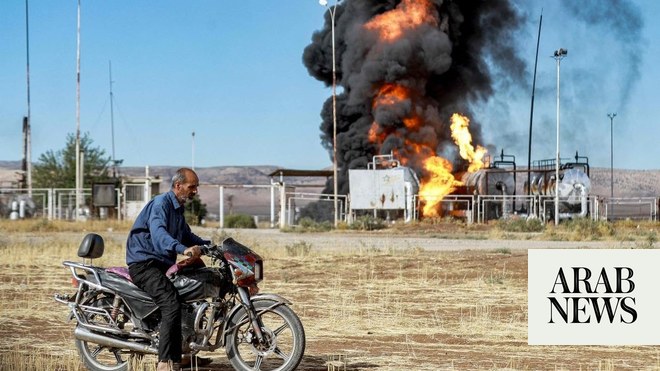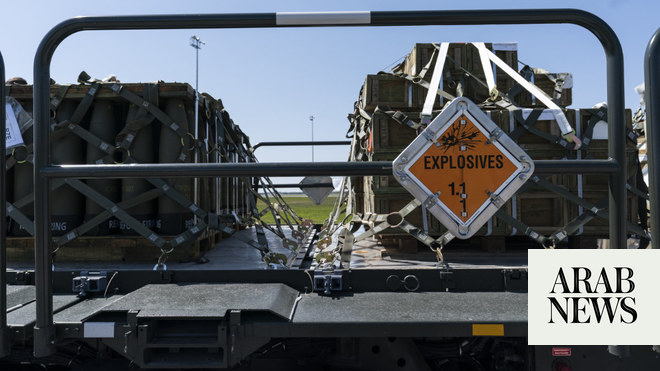
The Biden administration has received a lot of criticism for its mismanagement of the hasty US withdrawal from Afghanistan. However, Joe Biden is not the first president to have taken a wrong decision that has had strong repercussions for America. Everyone makes erroneous decisions — the irony is that, in a country that brags about its checks and balances, there is really no one who can say: “No, Mr. President, you can’t.”
In a shocking announcement, a Republican congressman last week claimed that the chaotic withdrawal had left $85 billion-worth of weapons in the hands of the Taliban. Though there is not enough evidence to prove that this much weaponry is now under the control of the Taliban — as this amount was spent over two decades and not only on equipment — the group was able to capture a significant amount of the firepower provided by the US and paid for by US taxpayers.
The US withdrawal from Afghanistan and subsequent swift takeover by the Taliban show the potential gravity of a mistake made by a president. Despite the grim views offered by intelligence reports of what would result from the US withdrawal, Biden told the public on July 8 that the Afghan government would not fall and that this was not a comparable situation to the end of the Vietnam War. This was a case of manipulating intelligence reports to appease the public and sugar-coat a decision made by the president. Biden is not the first to do so and he will definitely not be the last.
The motivation for the war in Iraq — which is a major cause of the calamities currently befalling the region — was another case built on the manipulation of intelligence reports. A 2008 Senate Intelligence Committee report found that claims by the White House linking Iraq to Al-Qaeda were “not substantiated by the intelligence.” Also, before the war, the State Department and the Department of Energy raised doubts about the conclusion that Iraq had weapons of mass destruction. However, their dissent was never taken seriously.
The Iraq war was a classic example of intelligence being misused and spun by the White House. There was not enough evidence to prove that Saddam Hussein had weapons of mass destruction, yet the Bush administration used bits and pieces to justify the 2003 invasion. The supposed weapons of mass destruction became an issue on which public consensus could be created, and this is why the administration used it.
The Iraq war was a classic example of intelligence being misused and spun by the White House.
Dania Koleilat Khatib
The US is a country of institutions and the separation of powers, which ensures that no one consolidates too much control and thus usurps power. Nevertheless, the system gives the president tremendous control over the country’s decision-making. He is the nation’s chief executive and commander in chief. The greater authority one person has, the greater the impact of any blunder they make.
In a democracy, the military is subordinate to the civilian authority. However, given the considerations that ought to guide political decisions, the military, intelligence agencies and bureaucrats in general should have a bigger say, especially in decisions that involve war, peace and the national interest. Such decisions have repercussions for many years to come, while a president is never in it for the long run. If major decisions were vetted by the military and the intelligence agencies, they would be shielded from the political factors that motivate presidents’ decision-making. Presidents are often pushed in a certain direction by considerations of popularity and the influence of interest groups.
There is a major problem with politics and populism. As a president takes office, his campaign promises become his policy program and the interest groups that financed his campaign want to see a return on their investment. Additionally, the president needs to present something palpable to the average American. With all these elements in place and all this pressure on one person, whose main purpose was only to get elected or re-elected, it makes one wonder how much a president considers the national interest and the long-term repercussions when making decisions. This is why every president is limited by a narrow vision set by his financial donors and a short-sightedness due to the considerations of attempting to get re-elected for a second term.
On the other hand, military and intelligence leaders are not elected and they are not in constant interface with the public. They don’t get money from donors to whom they owe their job. They also have their boots on the ground and know the reality of the situation. However, since they don’t have power — as we saw in the case of Iraq — the president can use military intelligence as a tool to justify a decision he has already taken, instead of using it to inform his decision.
Therefore, checks by the intelligence and military communities are necessary to improve America’s decision-making. Their approval would not tarnish democracy or belittle the president, who is the choice of the American people. On the contrary, such checks, if put in place, would give the president the protection he needs to justify his actions to the public. They would also protect democracy from the influence of narrow interest groups and from emotional populism that is devoid of pragmatism and realism.
After the blunder of Iraq, a new procedure was put in place for major decisions, whereby the heads of intelligence agencies now have to personally vouch for the credibility of their evidence in order to improve the decision-making process. However, this is not enough to prevent major errors from occurring. People who know exactly what the situation is should have the power to say: “No, Mr. President, you can’t.”
Dr. Dania Koleilat Khatib is a specialist in US-Arab relations with a focus on lobbying. She is co-founder of the Research Center for Cooperation and Peace Building, a Lebanese NGO focused on Track II. She is also an affiliate scholar with the Issam Fares Institute for Public Policy and International Affairs at the American University of Beirut.
Disclaimer: Views expressed by writers in this section are their own and do not necessarily reflect Arab News" point-of-view












